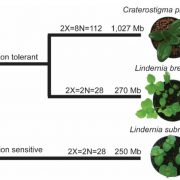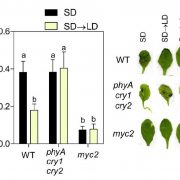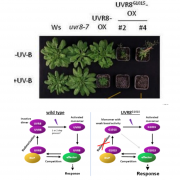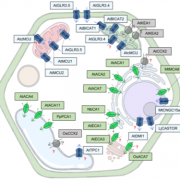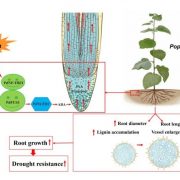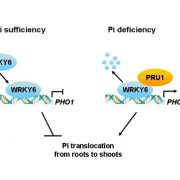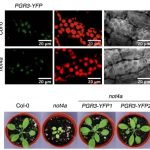Cold translation: Ribosome-mediated translation inhibition senses cold stress in plants (bioRxiv)
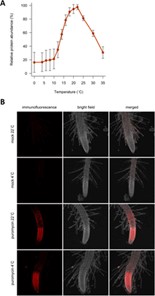 A drop in ambient temperature adversely affects plant growth and development. While the primary molecular pathway in response to cold stress involves the expression of CBF transcription factors, Guillaume-Schöpfer and colleagues found cold stress-induced inhibition of ribosome translation machinery to control CBF expression. To start, the rate of protein synthesis was found to be proportional to the decrease in temperature. The authors showed that cycloheximide (CHX) specifically induced rapid expression of CBF and other early cold-responsive genes. Strikingly, this CHX-mediated induction of cold-responsive genes required functional CALMODULIN-BINDING TRANSCRIPTION ACTIVATOR (CAMTA) proteins, which are the upstream regulators of CBFs. Further, the authors showed CHX-mediated increase in cytosolic and nuclear free calcium levels are required for CBF expression that may possibly work through the CAMTAs. Together, they suggest ribosomes to be “cryosensors” that control the early phase of gene expression in response to cold stress. (Summary by Pavithran Narayanan @pavi_narayanan). bioRxiv 10.1101/2020.12.07.414789v1.full
A drop in ambient temperature adversely affects plant growth and development. While the primary molecular pathway in response to cold stress involves the expression of CBF transcription factors, Guillaume-Schöpfer and colleagues found cold stress-induced inhibition of ribosome translation machinery to control CBF expression. To start, the rate of protein synthesis was found to be proportional to the decrease in temperature. The authors showed that cycloheximide (CHX) specifically induced rapid expression of CBF and other early cold-responsive genes. Strikingly, this CHX-mediated induction of cold-responsive genes required functional CALMODULIN-BINDING TRANSCRIPTION ACTIVATOR (CAMTA) proteins, which are the upstream regulators of CBFs. Further, the authors showed CHX-mediated increase in cytosolic and nuclear free calcium levels are required for CBF expression that may possibly work through the CAMTAs. Together, they suggest ribosomes to be “cryosensors” that control the early phase of gene expression in response to cold stress. (Summary by Pavithran Narayanan @pavi_narayanan). bioRxiv 10.1101/2020.12.07.414789v1.full


